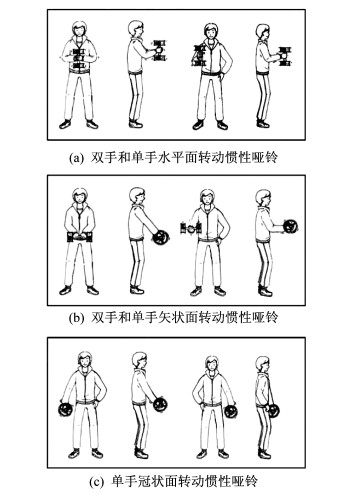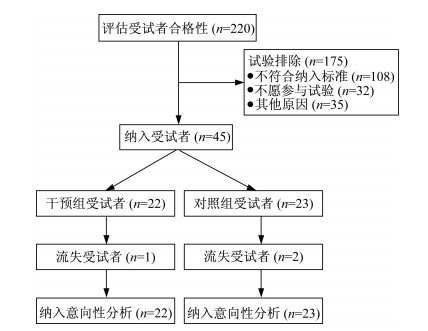Intervention Effects of 12-week Momentum-based Dumbbell Exercise on Older Adults with Mild Cognitive Impairment
-
摘要:目的 观察12周惯性哑铃练习对轻度认知损害(MCI)老年人认知功能、身体活动能力、生活质量和睡眠质量的影响,并探讨认知改善与其他功能改变之间的关系。方法 将45名MCI老年人随机分为干预组(n=22)和对照组(n=23)。干预组受试者进行惯性哑铃练习(3次/周,60 min/次,持续12周),对照组不进行运动干预。结果 12周后,干预组受试者阿尔茨海默病评定量表-认知部分(ADAS-Cog)总分/指令得分、蒙特利尔认知评估量表(MoCA)评分、起立行走计时(TUG)和SF-36健康调查问卷(SF-36)心理总得分均显著改善(均P < 0.05)。与对照组相比,干预组受试者ADAS-Cog总分/单词回忆得分/注意力得分、简明精神量表(MMSE)评分、TUG和匹兹堡睡眠指数(PSQI)的改善程度均具有显著差异(P < 0.05或P=0.05)。偏相关分析结果显示,SF-36心理总得分改变(r=-0.712)、PSQI改变(r=-0.380)与认知改善程度均呈显著负相关。结论 12周惯性哑铃练习可显著提高MCI老年人的认知功能,并对其移动能力、生活质量和睡眠质量具有积极影响,且心理和睡眠改变程度可能影响认知功能的改善效果。Abstract:Objectives To examine the effects of 12-week momentum-based dumbbell training on cognitive function, physical function, quality of life and sleep quality on older adults with mild cognitive impairment (MCI), and to explore the relationship among these changes.Methods Forty-five community-dwelling older adults with MCI were randomly assigned to either a dumbbell training group(DTG, n=22) or a control group (CG, n=23). Participants in the DTG participated in exercise sessions 3 times weekly for 12 weeks.Results There were significant within-group changes(improvement) in ADAS-Cog total score, instruction, MoCA and SF-36 Mental Component Summary(P < 0.05).Compared to CG, participants in the DTG significantly improved in ADAS-Cog total score, word recall and attention, MMSE, TUG and PSQI(P ≤ 0.05). And the changes in SF- 36 MCS(r=-0.712) and PSQI(r=-0.380) were significantly correlated with the changes in cognitive function.Methods A 12-week momentum-based dumbbell training is effective for improving cognitive functions and has potential benefits for improving the physical function in older adults with MCI. These pre-post changes (mental and sleep condition) may influence the degree of cognitive benefits induced by training.
-
随着全球老龄化程度的加剧,痴呆等慢性非传染性疾病的患病人数逐年增加。2010年全球痴呆患者总数达3 560万,预计2050年可达1.15亿,其中阿尔茨海默病(Alzheimer’s disease, AD)为最常见的痴呆类型[1]。如果能使其延迟发病1年,AD患者可在世界范围内减少920万人[2]。对痴呆的早期诊断与预防是阻止疾病发生的有效策略,而识别具有痴呆风险的人群并寻求有效干预手段尤其重要。轻度认知损害(mild cognitive impairment, MCI)是介于正常衰老和痴呆之间的一种极不稳定的过渡状态[3]。作为痴呆发病的前兆,MCI患者有较高的痴呆患病风险,其痴呆年发病率是健康老年人的5~15倍[4]。临床研究[5-6]发现,运动锻炼对MCI或痴呆老年人的认知功能有积极影响,但运动干预的效果并不一致。系统性综述[7]指出,认知参与度高的复杂性运动或可更大限度地改善老年人的认知功能。
惯性哑铃是一种多关节运动器械,由上肢转动哑铃产生的惯性力带动全身周期性摇摆[8],可根据不同转动方向和转动姿势增加对练习者的认知刺激,并通过改变转动时间和动作方式增加运动的难度和复杂性,可能具有改善认知功能的潜在作用。可行性研究[9]证明,惯性哑铃练习是一种适合中老年人的新型运动方式,对移动能力、平衡能力、生活质量和睡眠质量等健康指标(与老年人的认知表现和大脑健康有关)具有积极影响,但对MCI老年人的健康指标影响不明确。因此,笔者通过观察12周惯性哑铃练习对MCI老年人认知功能、身体活动能力、生活质量和睡眠质量等的影响,探讨认知改善与其他功能改变的关系。
1. 研究对象与方法
1.1 研究对象
选取遗忘型MCI(aMCI)老年人为受试者,参照Petersen等[4]提出的aMCI诊断标准并由临床医生诊断确定。纳入标准:①年龄≥65岁,无器质性疾病,身体基本健康;②具有一定认知功能障碍,但未达到痴呆诊断标准[蒙特利尔认知评估量表(MoCA)评分 < 26, 简明精神量表(MMSE)评分 > 24];③存在记忆力降低主诉,但其他认知功能表现正常;④日常生活能力正常;⑤无规律性运动锻炼,在运动监控状态下可完成一定程度的体育活动。排除标准:①伴有严重心脑血管疾病;②过去6个月有上肢损伤史,严重肌病或骨质疏松,腰椎功能障碍、损伤或其他不宜久站的疾病;③有严重认知障碍、精神疾病或其他神经退行性疾病;④存在肝肾功能障碍、药物/酒精滥用和感染等影响认知功能的因素。试验开始前,受试者均被告知研究目的和内容,并签署知情同意书。
1.2 试验设计与干预措施
于2014年5—9月进行为期12周的随机对照试验,经历了受试者招募、随机分配、基线值(baseline)测试、运动干预、干预后指标测试和数据统计分析等过程。受试者被随机分为干预组和对照组。研究的样本量由主要结局指标阿尔茨海默病评定量表-认知部分(ADAS-Cog)总分决定。参考文献[10]的方法,按运动干预对ADAS-Cog总分改善的效应值达0.40、双侧显著性检验(α=0.05)强度达80%进行估算,需要40名受试者参与本试验。考虑到10%的流失率,所需总样本量至少应为44名受试者(每组22人)。
1.2.1 干预组
在运动监控状态下,干预组实施12周惯性哑铃(两侧设有离心摆球,大小和质量均统一)运动健身方案(3次/周,60 min/次),包括3个运动姿势(水平面、矢状面、额状面)、3种转动方式(双手、左手和右手转动)和2种转动方向(顺时针和逆时针),共18种练习动作,每次训练选取其中6种,如图 1所示。当受试者熟练掌握动作或适应当前运动强度时,增加单次转动时间或新动作以增加运动难度。每次训练包括热身(约5 min)、哑铃锻炼(约50 min)和放松(约5 min)。热身后,在教练员指导下进行每组6个动作的惯性哑铃练习,每组训练9~12 min后进行约1 min的放松练习,共4~5组。训练后进行约5 min的拉伸放松活动。
1.2.2 对照组
对照组受试者在12周随机对照试验阶段不参与干预性运动,仅保持其原有的日常活动状态。
1.3 观察指标
所有测试在干预试验开始前或干预试验结束后1周内完成。观察指标为ADAS-Cog总分、MMSE评分、MoCA评分、起立行走计时(TUG)、Berg平衡量表(BBS)评分、SF-36健康调查问卷(SF-36)评分和匹兹堡睡眠指数(PSQI)。其中,ADAS-Cog总分为主要结局指标,其他指标为次要结局指标。
1.3.1 认知功能测试
ADAS-Cog由12个认知测试条目组成,评估记忆力、语言、操作能力和注意力方面的认知缺陷,其量表总分为0~75分,得分越高,表明认知功能损害程度越严重; 除总分外,还包括单词回忆、命名、指令、结构性练习、意向性练习、定向、单词辨认、回忆测验指令、口语能力、找词困难、语言理解能力和注意力等单项认知功能评估[11]。MMSE中文版评估受试者总体认知功能,包括定向、登记、注意和计算、语言复述、三步指令、阅读理解、书写和临摹等方面,判断认知损害的严重程度,总分为0~30分,得分越高表示认知功能越好[12]60-70。MoCA中文版评估认知损害程度,包括交替连线测验、视空间技能、命名、记忆、注意力、句子复述、词语流畅性、抽象、延迟回忆和定向等认知功能,总分为0~30分,得分越高表示认知功能越好[12]80-89。
1.3.2 身体活动能力测试
TUG评估老年人的日常移动能力,要求受试者尽可能快速地从椅子上站起,笔直向前行走3 m后转身走回椅子并坐下,记录其完成的时间[13]。BBS评估老年人的平衡能力与跌倒风险,包括由坐到站、独立站立、独立坐、由站到坐、床-椅转移、闭眼站立、双足并拢站立、站立位上肢前伸、站立位从地上拾物、转身向后看、转身一周、双足交替踏台阶、双足前后站立、单腿站立等14项内容,总分为56分,得分越高表示平衡能力越好[14]。
1.3.3 生活质量测试
采用SF-36[15]从生理机能、生理职能、躯体疼痛、一般健康状况、精力、社会功能、情感职能、精神健康等8个健康维度评估老年人的生活质量。使用Quality Metric评分软件进一步计算生理总得分(PCS)和心理总得分(MCS),其范围为0~100分,得分越高表示生活质量越高。
1.3.4 睡眠质量测试
PSQI量表为评价1个月内睡眠质量的口头问卷,包括19个自我评价条目和7个睡眠质量成分(主观睡眠质量、入睡时间、睡眠时间、睡眠效率、睡眠障碍、催眠药物使用、日间功能障碍)评价,累计得分为PSQI总分(0~21分),得分越高表示睡眠质量越差[16]。
1.4 统计学方法
数据分析基于意向性分析原则。使用独立样本t检验和重复测量方差分析分别评估干预前后观察指标变化的组内和组间差异。使用偏相关分析对年龄、性别、受教育时间等协变量进行控制,分析身体活动能力、生活质量和睡眠质量改变与认知功能改善的相关性。使用SPSS 21.0软件进行统计分析,以P < 0.05为显著性水平。
2. 研究结果
2.1 受试者基本情况
总计220名社区老年人参与评估,其中175人因不符合纳入标准、不愿参加试验、时间冲突等原因被排除。最终有45名受试者纳入本试验,其中干预组22名,对照组23名(图 2)。干预前,2组受试者的基本情况[年龄、性别、受教育时间、体质量指数(BMI)等]和认知功能均无显著性差异(P=0.15~0.82,表 1)。
表 1 受试者基本情况Table 1. Baseline characteristics of trial participants项目 干预组(n=22) 对照组(n=23) P 年龄/岁 69.00±3.83 70.43±5.53 0.32 女性占比/%a 73 70 0.82 受教育时间/a 9.82±2.75 9.52±2.61 0.71 BMI/(kg·m-2) 24.75±3.44 23.9±2.58 0.35 MMSE评分 27.23±1.63 26.43±2.00 0.15 MoCA评分 20.59±2.92 20.96±2.70 0.67 注:a代表分类数据,以百分数表示,采用χ2检验;其他均为定量数据,以均数±标准差表示,采用t检验。 2.2 受试者依从性和不良事件
在试验实施过程中,干预组受试者流失1名(家人生病)、对照组流失2名(生病和旅游),流失率 < 10%。干预组其他受试者完成12周运动训练,平均参与训练31次(24~36次),平均参与率为85%(SD=12%)。运动干预过程中无不良反应(如肌肉酸痛、运动疲劳、跌倒等)发生。
2.3 惯性哑铃练习对认知功能的影响
2.3.1 主要结局指标
与基线相比,12周惯性哑铃练习后,干预组受试者ADAS-Cog评估明显改善,得分显著降低[改变均值M=-2.39, 95%CI(-3.59, -1.18)],且差异有统计学意义(t=-4.12, P < 0.01);对照组受试者ADAS-Cog虽无显著改变(t=1.59, P=0.13),但有增加趋势[M=1.93, 95%CI(-0.58, 4.44)]。与对照组相比,干预组受试者经12周惯性哑铃练习后,ADAS-Cog显著改善,其改变程度差异有统计学意义(F=6.95, P=0.012)(表 2)。
表 2 惯性哑铃练习对认知功能的干预效果Table 2. Effect of momentum-based dumbbell training on cognitive function变量 干预前 干预后 12周改变量(95%CI) 组间差异 干预组(n=22) 对照组(n=23) 干预组(n=22) 对照组(n=23) 干预组(n=22) 对照组(n=23) F P ES ADAS-Cog总分 10.23±3.13 10.94±5.68 7.85±2.80 12.87±4.80 -2.39(-3.59,-1.18)** 1.93(-0.58,4.44) 6.95 0.01$ 1.28 单词回忆 2.83±0.95 3.25±1.33 2.76±0.78 3.96±1.35 -0.07(-0.47,0.33) 0.71(-0.03,1.45) 9.08 < 0.01$$ 1.09 命名 0.23±0.43 0.30±0.56 0.18±0.39 0.17±0.49 -0.05(-0.21,0.12) -0.13(-0.40,0.14) 0.09 0.77 0.02 指令 0.91±0.97 0.83±1.11 0.45±0.51 1.22±0.95 -0.45(-0.86,-0.05)* 0.39(-0.14,0.92) 2.38 0.13 1.00 结构性练习 0.68±0.72 0.70±0.47 0.55±0.60 0.57±0.59 -0.14(-0.48,0.21) -0.13(-0.40,0.14) 0.01 0.91 0.03 意向性练习 0.32±0.48 0.26±0.54 0.23±0.53 0.78±1.20 -0.09(-0.32,0.14) 0.52(-0.03,1.07) 2.13 0.15 0.60 定向 0.27±0.70 0.17±0.49 0.09±0.29 0.35±0.57 -0.18(-0.51,0.14) 0.17(-0.16,0.51) 0.49 0.49 0.56 单词辨认 4.23±2.35 3.91±2.02 3.23±1.60 4.17±2.21 -1.00(-2.22,0.22) 0.26(-0.60,1.12) 0.40 0.53 0.49 回忆测试指令 0.14±0.35 0.35±0.71 0.00±0.00 0.17±0.39 -0.14(-0.29,0.02) -0.17(-0.46,0.11) 3.22 0.08 0.63 口语能力 0.09±0.29 0.13±0.46 0.09±0.29 0.22±0.52 0.00(-0.19,0.19) 0.09(-0.20,0.38) 0.92 0.34 0.30 找词困难 0.14±0.35 0.26±0.69 0.05±0.21 0.26±0.45 -0.09(-0.28,0.10) 0.00(-0.37,0.37) 3.28 0.08 0.61 语言理解能力 0.27±0.55 0.61±0.89 0.18±0.39 0.52±0.90 -0.09(-0.32,0.14) -0.09(-0.54,0.36) 3.68 0.06 0.49 注意力 0.14±0.35 0.17±0.49 0.05±0.21 0.48±0.73 -0.09(-0.28,0.10) 0.30(-0.07,0.68) 5.22 0.03$ 0.80 MMSE评分 27.23±1.63 26.43±2.00 28.14±1.17 26.91±3.19 0.91(-0.04,1.86) 0.48(-1.09,2.05) 4.84 0.03$ 0.51 MoCA评分 20.59±2.92 20.96±2.70 23.36±2.72 20.87±4.83 2.77(1.27,4.27)** -0.09(-2.38,2.21) 1.89 0.18 0.64 注:ES为效应量;CI为置信区间;*表示P < 0.05, **表示P < 0.01,与基线相比;$表示P < 0.05, $$表示P < 0.01,组间比较。 2.3.2 其他认知功能
12周惯性哑铃练习后,干预组受试者ADAS-Cog单项评估中仅指令得分改变差异有统计学意义[M=-0.45, 95%CI(-0.86, -0.05);t=-2.34, P=0.03],其他ADAS-Cog单项指标有不同程度的改善趋势(M值为-1.00~0.00)。对照组受试者则无此改善趋势(M值为-0.17~0.71;P值为0.06~1.00)。与对照组相比,干预组受试者ADAS-Cog单词回忆得分改变(F=9.08, P < 0.01)和注意力得分改变(F=5.22, P=0.02)差异有统计学意义(表 2)。
干预组受试者经12周惯性哑铃练习后表现为总体认知功能水平较高,MoCA评分显著改善[M=2.77, 95%CI(1.27, 4.27);t=3.85, P < 0.01]。对照组受试者无显著改变。重复测量方差分析结果显示,12周惯性哑铃练习后,干预组受试者MMSE评分改变优于对照组,且差异有统计学意义(F=4.84, P=0.03)(表 2)。
2.4 惯性哑铃练习对身体活动能力的影响
12周惯性哑铃练习后,干预组受试者仅移动能力显著改善,表现为TUG显著减少[M=-0.71 s, 95%CI(-1.14, -0.27);t=3.38, P < 0.01];与对照组相比,这种改变差异有统计学意义(F=4.34,P=0.04)。对照组受试者表现为12周后BBS得分显著增加[M=1.04, 95%CI(0.18, 1.90);t=2.52, P=0.02],但与干预组间无统计学差异(F=0.01, P=0.91)(表 3)。
表 3 惯性哑铃练习对身体活动能力、生活质量与睡眠质量的干预效果Table 3. Effect of momentum-based dumbbell training on physical function, quality of life and sleep变量 干预前 干预后 12周改变量(95%CI) 组间差异 干预组(n=22) 对照组(n=23) 干预组(n=22) 对照组(n=23) 干预组(n=22) 对照组(n=23) F P ES TUG/s 8.00±1.23 8.45±1.47 7.29±0.77 8.10±1.01 -0.71(-1.14,-0.27)** -0.35(-0.86,0.15) 4.34 0.04$ 0.90 BBS 53.77±1.57 52.91±1.70 54.32±1.43 53.96±1.85 0.55(-0.03,1.12) 1.04(0.18,1.90)* 0.01 0.91 0.22 PCS 54.41±5.13 53.44±6.49 58.04±9.84 56.59±15.42 3.63(-1.36,8.62) 3.15(-3.36,9.67) 0.29 0.59 0.11 MCS 51.74±8.24 54.58±4.80 58.57±10.11 54.59±15.48 6.83(0.25,13.41)* 0.01(-5.82,5.84) 0.06 0.80 0.30 PQSI 6.00±3.24 4.16±2.39 5.22±3.15 3.79±2.57 -0.78(-2.54,0.98) -0.37(-1.35,0.61) 4.08 0.05$ 0.50 注:CI为置信区间;ES为效应量;*表示P < 0.05,**表示P < 0.01,与基线相比;$表示P < 0.05,组间比较(采用协方差分析)。 2.5 惯性哑铃练习对生活质量与睡眠质量的影响
12周惯性哑铃训练后,干预组受试者SF-36 MCS显著提高[M=6.83, 95%CI(0.25, 13.41);t=2.16, P=0.04],而对照组受试者SF-36得分无显著改变。干预组受试者睡眠质量较干预前无显著改变(P > 0.05),但干预组PSQI总分优于对照组(F=4.08, P=0.05),其影响为中等程度(ES=0.50)(表 3)。
2.6 身体活动能力、生活质量和睡眠质量改变与认知功能改善的相关性
12周干预试验后,2组受试者的身体活动能力、生活质量和睡眠质量较试验前有不同程度改变。将相应指标纳入偏相关分析,结果(表 4)显示,在控制年龄、性别和受教育时间情况下,身体活动改变与认知功能改善之间无显著相关性(P > 0.05),但生活质量改变(SF-36 MCS)与ADAS-Cog总分改善间呈显著负相关(r=-0.712, P < 0.01),且PSQI总分改变与MMSE评分改善间呈显著负相关(r=-0.380, P=0.05)。
表 4 身体活动能力、生活质量和睡眠质量改变与认知功能改善的相关性Table 4. Correlations between changes in physical function, quality of life and sleep and cognitive function变量 TUG BBS PCS MCS PSQI ADAS-Cog总分 0.141 -0.057 -0.181 -0.712** 0.297 MMSE评分 -0.079 -0.248 -0.069 -0.042 -0.380* MoCA评分 0.071 -0.142 0.034 0.127 -0.183 注:表中数据为相关系数(r),*表示P < 0.05, **表示P < 0.01。 3. 讨论
12周惯性哑铃练习后,干预组受试者ADAS-Cog总分/指令得分与MoCA评分均较基线显著改善;与对照组相比,干预组受试者ADAS-Cog总分/单词回忆得分/注意力得分与MMSE评分改善均具有显著差异,且可引起较大的效应量(ES为0.51~1.28)。此外,运动干预可显著改善MCI老年人的移动能力(TUG)、生活质量(SF-36 MCS)和睡眠质量(PSQI),且SF-36 MCS和PSQI改变程度与认知功能改善具有显著相关性。干预过程中,受试者对运动方案满意度较高,具有较高依从性且无不良反应出现。
现有研究多关注有氧运动、抗阻训练或多模式运动方式对MCI老年人认知功能的影响,只有少数研究[6]涉及特殊运动类型或上下肢协调运动。例如,Wei等[17]发现,6个月的手球练习可显著提高MCI老年人的总体认知功能。此外,Nascimento等[18]在研究中使用“FcTsim”运动方案(由5个日常生活中常使用的任务运动组成,包括单侧运动、双侧运动、任务切换和跨身体中线运动)作为改善MCI老年人认知功能的干预手段,结果提示,该方案不仅显著提高了总体认知水平,还对特殊认知功能(记忆力和执行功能等)具有积极影响。作为一种上下肢多关节协调运动,本文结果同样证明了惯性哑铃练习对MCI老年人的不同认知功能具有积极影响。
在认知改善效果方面,选取ADAS-Cog作为评价干预方案对认知功能改善情况的关键预后指标[10],其结果与前人结果相同。例如,Lautenschlager等[19]和Suzuki等[20]的研究证明,有氧运动和多模式运动方案可显著改善MCI老年人的ADAS-Cog评估情况。除ADAS-Cog总分外,惯性哑铃练习对该量表的单项特殊认知功能同样具有积极影响,包括记忆力和注意力。此外,大多数随机对照研究[17-18,21]关注的是MMSE和MoCA这2个综合反映老年人认知功能的评价量表,且结果表明,运动锻炼(如多模式运动训练、手球训练等功能性训练)对改善MCI老年人的总体认知功能具有显著效应。尽管干预组受试者经12周惯性哑铃练习后,其MMSE评分改变未达到统计学差异,但其改变存在显著组间差异(ES=0.51),提示惯性哑铃练习可以作为MCI老年人改善认知功能和延缓痴呆发病的一种新型运动方式。
流行病学调查[22]指出,认知功能障碍常伴随功能独立性、生活质量和睡眠质量降低等生理和心理问题。但临床干预研究较少在关注MCI老年人认知功能改善的同时,考虑影响老年人真实生活状态的其他健康指标,如身体活动能力、生活质量和睡眠质量等。Langoni等[23-24]观察了24周有氧运动结合抗阻训练对MCI老年人移动能力(TUG)和平衡能力(BBS和功能性伸展)的影响,发现运动组受试者的2种运动能力均显著提高。笔者发现,12周惯性哑铃练习仅对受试者移动能力有显著影响,对其平衡能力改善无明显干预效果。2项研究结果出现差异的可能原因:①本文干预周期较短(36次,12周);②Langoni等[23-24]的研究采用了渐进性运动训练方案,运动强度较大,运动方式多样化。
目前,有关运动锻炼对MCI老年人生活质量和睡眠质量影响的研究较少,且结果存在一定争议。例如,Lautenschlager等[19]的研究指出,12个月的中等强度有氧运动对MCI老年人的生活质量(SF-36 PCS和MCS)无显著影响。Chan等[25]则发现,2个月太极拳练习可显著改善MCI老年人的生活质量(SF-12 MCS)和睡眠质量(PQSI总分、睡眠时间和睡眠效率)。与其结果类似,12周惯性哑铃练习后,干预组受试者的生活质量,特别是心理健康得分(SF-36 MCS)显著提高。此外,惯性哑铃练习对MCI老年人的睡眠质量也具有积极影响,表现为干预组受试者PSQI总分改善程度显著优于对照组。
尽管目前尚不清楚惯性哑铃练习改善认知功能的具体作用机制,但练习过程中老年人需要不断改变惯性哑铃动作、转动方向并感知其身体姿势的持续变化,该过程需要多种认知功能的参与,包括运动学习与记忆力、视觉-空间定向力、选择性注意力、执行功能等。这种将运动与认知刺激融入多任务哑铃训练的模式,有助于促进训练者的认知功能提高[5, 8]。此外,认知功能障碍是由于大脑前额叶、顶叶和扣带回等脑区退化所致,而这些退化病变的脑区也可能是影响或累及身体活动能力和维持姿势控制的重要区域[26]。运动锻炼不仅能提高运动能力(平衡、姿势控制和步态等),还可能对所涉脑区的认知功能具有改善作用。同时,运动锻炼改善认知功能相关的健康因素也已被广泛证明,例如降低慢性病风险、提高生活质量、改善睡眠和情绪等[19, 27]。
前期研究[9, 28]证明,惯性哑铃和惯性杠铃训练(与惯性哑铃类似的运动模式)可显著提高运动控制能力、生活质量和睡眠质量等。本文中,相关性分析无法证实运动引起的身体活动能力改变与认知功能改善有关,但生活质量(心理健康)和睡眠质量改善与认知功能的改善程度显著相关,提示惯性哑铃练习对改善神经精神状态具有积极作用,这可能会间接影响老年人的认知健康。一个不可忽视的现象是,本文中运动锻炼采用群组方式,这种团体训练所产生的社交互动也可能促进群体的社会化、交互性和融合性,从而进一步增加练习者的认知刺激并有助于认知功能的改善。
本文采用惯性哑铃多关节运动干预模式改善MCI老年人认知功能,其结果补充了关于运动改善认知功能的研究证据,为维持认知健康、延缓痴呆发病提供了一种新的多关节运动方式,进一步验证了认知参与度较高且积极影响神经精神状态的运动方式可能会更大限度提高认知功能。但本文也存在一定的局限性:①干预组在惯性哑铃练习过程中的群体沟通或/和霍桑效应对认知功能产生的影响无法排除;②仅通过间接指标推测惯性哑铃练习对认知功能改善的可能机制,未针对中枢神经系统和生物学指标等方面展开机制研究;③缺少干预后的随访过程,无法确定运动对认知功能影响的维持时间。
4. 结论与建议
12周惯性哑铃练习可显著提高MCI老年人的认知功能,并对移动能力、生活质量和睡眠质量具有积极影响,且神经精神状态(心理和睡眠)的改变程度可能影响认知功能的改善效果。未来在优化MCI老年人运动干预策略时,可考虑增加运动干预认知的参与程度及其对神经精神状态的影响。本文仅就惯性哑铃运动干预对认知功能影响进行了初步研究,未来仍需采用大样本和长期随访的研究设计进一步验证该运动方式对认知功能影响的有效性与持续性。
-
表 1 受试者基本情况
Table 1 Baseline characteristics of trial participants
项目 干预组(n=22) 对照组(n=23) P 年龄/岁 69.00±3.83 70.43±5.53 0.32 女性占比/%a 73 70 0.82 受教育时间/a 9.82±2.75 9.52±2.61 0.71 BMI/(kg·m-2) 24.75±3.44 23.9±2.58 0.35 MMSE评分 27.23±1.63 26.43±2.00 0.15 MoCA评分 20.59±2.92 20.96±2.70 0.67 注:a代表分类数据,以百分数表示,采用χ2检验;其他均为定量数据,以均数±标准差表示,采用t检验。 表 2 惯性哑铃练习对认知功能的干预效果
Table 2 Effect of momentum-based dumbbell training on cognitive function
变量 干预前 干预后 12周改变量(95%CI) 组间差异 干预组(n=22) 对照组(n=23) 干预组(n=22) 对照组(n=23) 干预组(n=22) 对照组(n=23) F P ES ADAS-Cog总分 10.23±3.13 10.94±5.68 7.85±2.80 12.87±4.80 -2.39(-3.59,-1.18)** 1.93(-0.58,4.44) 6.95 0.01$ 1.28 单词回忆 2.83±0.95 3.25±1.33 2.76±0.78 3.96±1.35 -0.07(-0.47,0.33) 0.71(-0.03,1.45) 9.08 < 0.01$$ 1.09 命名 0.23±0.43 0.30±0.56 0.18±0.39 0.17±0.49 -0.05(-0.21,0.12) -0.13(-0.40,0.14) 0.09 0.77 0.02 指令 0.91±0.97 0.83±1.11 0.45±0.51 1.22±0.95 -0.45(-0.86,-0.05)* 0.39(-0.14,0.92) 2.38 0.13 1.00 结构性练习 0.68±0.72 0.70±0.47 0.55±0.60 0.57±0.59 -0.14(-0.48,0.21) -0.13(-0.40,0.14) 0.01 0.91 0.03 意向性练习 0.32±0.48 0.26±0.54 0.23±0.53 0.78±1.20 -0.09(-0.32,0.14) 0.52(-0.03,1.07) 2.13 0.15 0.60 定向 0.27±0.70 0.17±0.49 0.09±0.29 0.35±0.57 -0.18(-0.51,0.14) 0.17(-0.16,0.51) 0.49 0.49 0.56 单词辨认 4.23±2.35 3.91±2.02 3.23±1.60 4.17±2.21 -1.00(-2.22,0.22) 0.26(-0.60,1.12) 0.40 0.53 0.49 回忆测试指令 0.14±0.35 0.35±0.71 0.00±0.00 0.17±0.39 -0.14(-0.29,0.02) -0.17(-0.46,0.11) 3.22 0.08 0.63 口语能力 0.09±0.29 0.13±0.46 0.09±0.29 0.22±0.52 0.00(-0.19,0.19) 0.09(-0.20,0.38) 0.92 0.34 0.30 找词困难 0.14±0.35 0.26±0.69 0.05±0.21 0.26±0.45 -0.09(-0.28,0.10) 0.00(-0.37,0.37) 3.28 0.08 0.61 语言理解能力 0.27±0.55 0.61±0.89 0.18±0.39 0.52±0.90 -0.09(-0.32,0.14) -0.09(-0.54,0.36) 3.68 0.06 0.49 注意力 0.14±0.35 0.17±0.49 0.05±0.21 0.48±0.73 -0.09(-0.28,0.10) 0.30(-0.07,0.68) 5.22 0.03$ 0.80 MMSE评分 27.23±1.63 26.43±2.00 28.14±1.17 26.91±3.19 0.91(-0.04,1.86) 0.48(-1.09,2.05) 4.84 0.03$ 0.51 MoCA评分 20.59±2.92 20.96±2.70 23.36±2.72 20.87±4.83 2.77(1.27,4.27)** -0.09(-2.38,2.21) 1.89 0.18 0.64 注:ES为效应量;CI为置信区间;*表示P < 0.05, **表示P < 0.01,与基线相比;$表示P < 0.05, $$表示P < 0.01,组间比较。 表 3 惯性哑铃练习对身体活动能力、生活质量与睡眠质量的干预效果
Table 3 Effect of momentum-based dumbbell training on physical function, quality of life and sleep
变量 干预前 干预后 12周改变量(95%CI) 组间差异 干预组(n=22) 对照组(n=23) 干预组(n=22) 对照组(n=23) 干预组(n=22) 对照组(n=23) F P ES TUG/s 8.00±1.23 8.45±1.47 7.29±0.77 8.10±1.01 -0.71(-1.14,-0.27)** -0.35(-0.86,0.15) 4.34 0.04$ 0.90 BBS 53.77±1.57 52.91±1.70 54.32±1.43 53.96±1.85 0.55(-0.03,1.12) 1.04(0.18,1.90)* 0.01 0.91 0.22 PCS 54.41±5.13 53.44±6.49 58.04±9.84 56.59±15.42 3.63(-1.36,8.62) 3.15(-3.36,9.67) 0.29 0.59 0.11 MCS 51.74±8.24 54.58±4.80 58.57±10.11 54.59±15.48 6.83(0.25,13.41)* 0.01(-5.82,5.84) 0.06 0.80 0.30 PQSI 6.00±3.24 4.16±2.39 5.22±3.15 3.79±2.57 -0.78(-2.54,0.98) -0.37(-1.35,0.61) 4.08 0.05$ 0.50 注:CI为置信区间;ES为效应量;*表示P < 0.05,**表示P < 0.01,与基线相比;$表示P < 0.05,组间比较(采用协方差分析)。 表 4 身体活动能力、生活质量和睡眠质量改变与认知功能改善的相关性
Table 4 Correlations between changes in physical function, quality of life and sleep and cognitive function
变量 TUG BBS PCS MCS PSQI ADAS-Cog总分 0.141 -0.057 -0.181 -0.712** 0.297 MMSE评分 -0.079 -0.248 -0.069 -0.042 -0.380* MoCA评分 0.071 -0.142 0.034 0.127 -0.183 注:表中数据为相关系数(r),*表示P < 0.05, **表示P < 0.01。 -
[1] World Health Organization, Alzheimer's Disease International.Dementia:A public health priority[M]. Geneva:WHO Press, 2012:12
[2] BROOKMEYER R, JOHNSON E, ZIEGLER-GRAHAM K, et al.Forecasting the global burden of Alzheimer's disease[J]. Alzheimer's & Dementia, 2007, 3(3):186-191 doi: 10.1016-j.jalz.2007.04.381/
[3] GAUTHIER S, REISBERG B, ZAUDIG M, et al.Mild cognitive impairment[J]. Lancet, 2006, 367(9518):1262-1270 doi: 10.1016/S0140-6736(06)68542-5
[4] PETERSEN R C, SMITH G E, WARING S C, et al.Mild cognitive impairment:Clinical characterization and outcome[J]. Archives of Neurology, 1999, 56(3):303-308 http://d.old.wanfangdata.com.cn/NSTLQK/NSTL_QKJJ0210610013/
[5] 吕娇娇, 刘宇.运动锻炼:一种预防老年性痴呆的有效手段[J].体育科学, 2016, 36(3):96-97 http://d.old.wanfangdata.com.cn/Periodical/njtyxyxb-skb200601003 [6] 吕娇娇, 刘宇.身体活动对轻度认知损害老年人认知功能的影响及其可能机制[J].中国康复医学杂志, 2016, 31(7):732-736 http://d.old.wanfangdata.com.cn/Periodical/zgkfyxzz201607023 [7] LYU J, FU W, LIU Y.Physical activity and cognitive function among older adults in China:A systematic review[J]. Journal of Sport and Health Science, 2016, 5(3):287-296 doi: 10.1016/j.jshs.2016.07.003
[8] 刘宇, 李海鹏, 刘翠鲜, 等.基于神经肌肉功能训练理论与方法的新型训练器械的研发与应用[J].体育科学, 2014, 34(2):87-94 doi: 10.3969/j.issn.1000-677X.2014.02.012 [9] 吕娇娇, 刘宇.惯性哑铃训练方案对中老年人身体活动能力的影响运动方案的可行性研究[C].大连: 第十七届全国运动生物力学学术交流大会论文集, 2014: 122 [10] ORRELL M, YATES L A, BURNS A, et al.Individual Cognitive Stimulation Therapy for dementia (iCST):Study protocol for a randomized controlled trial[J]. Trials, 2012, 13(1):172 http://d.old.wanfangdata.com.cn/OAPaper/oai_pubmedcentral.nih.gov_3522062
[11] ROSEN W G, MOHS R C, DAVIS K L.A new rating scale for Alzheimer's disease[J]. Journal of the American Academy of Child and Adolescent Psychiatry, 1984, 141(11):1356-1364
[12] 郭起浩, 洪震.神经心理评估[M].上海:上海科学技术出版社, 2013 [13] PODSIADLO D, RICHARDSON S.The timed "Up & Go":A test of basic functional mobility for frail elderly persons[J]. Journal of the American Geriatrics Society, 1991, 39(2):142-148 doi: 10.1111/j.1532-5415.1991.tb01616.x
[14] STEFFEN T M, HACKER T A, MOLLINGER L.Age-and gender-related test performance in community-dwelling elderly people:Six-minute walk test, berg balance scale, timed up & go test, and gait speeds[J]. Physical Therapy, 2002, 82(2):128-137 doi: 10.1093/ptj/82.2.128
[15] GANDEK B, WARE J.SF-36 health survey:Manual and interpretation guide[M]. Boston:The Health Institute, New England Medical Center, 1993:55-60
[16] BUYSSE D J, REYNOLDS C F, MONK T H, et al.The pittsburgh sleep quality index:A new instrument for psychiatric practice and research[J]. Psychiatry Research, 1989, 28(2):193-213 http://d.old.wanfangdata.com.cn/OAPaper/oai_doaj-articles_e92c8461eb5f4e1f74605fc31b58edbf
[17] WEI X H, JI L L.Effect of handball training on cognitive ability in elderly with mild cognitive impairment[J]. Neuroscience Letters, 2014, 566:98-101 doi: 10.1016/j.neulet.2014.02.035
[18] NASCIMENTO C M, PEREIRA J R, PIRES DE ANDRADE L, et al.Physical exercise improves peripheral BDNF levels and cognitive functions in elderly mild cognitive impairment individuals with different BDNF Val66Met genotypes[J]. Journal of Alzheimer's Disease, 2015, 43(1):81-91 http://www.wanfangdata.com.cn/details/detail.do?_type=perio&id=f0d9ed338f650fa7f81dfc561799cef5
[19] LAUTENSCHLAGER N T, COX K L, FLICKER L, et al.Effect of physical activity on cognitive function in older adults at risk for Alzheimer's disease:A randomized trial[J]. JAMA, 2008, 300(9):1027-1037 doi: 10.1001/jama.300.9.1027
[20] SUZUKI T, SHIMADA H, MAKIZAKO H, et al.A randomized controlled trial of multicomponent exercise in older adults with mild cognitive impairment[J]. PLoS One, 2013, 8(4):e61483 doi: 10.1371/journal.pone.0061483
[21] VARELA S, AYAN C, CANCELA J M, et al.Effects of two different intensities of aerobic exercise on elderly people with mild cognitive impairment:A randomized pilot study[J]. Clinical Rehabilitation, 2012, 26(5):442-450 doi: 10.1177/0269215511425835
[22] REYNOLDS C F Ⅲ, FRANK E, PEREL J M, et al.Nortriptyline and interpersonal psychotherapy as maintenance therapies for recurrent major depression:A randomized controlled trial in patients older than 59 years[J]. JAMA, 1999, 281(1):39-45 doi: 10.1001/jama.281.1.39
[23] LANGONI C D S, RESENDE T L, BARCELLOS A B, et al.The effect of group exercises on balance, mobility, and depressive symptoms in older adults with mild cognitive impairment:A randomized controlled trial[J]. Clinical Rehabilitation, 2018, 33(3):439-440 http://www.wanfangdata.com.cn/details/detail.do?_type=perio&id=10.1177/0272989X0402400411
[24] LANGONI C D S, RESENDE T L, BARCELLOS A B, et al.Effect of exercise on cognition, conditioning, muscle endurance, and balance in older adults with mild cognitive impairment:A randomized controlled trial[J]. Journal of Geriatric Physical Therapy, 2019, 42(2):E15-E22 doi: 10.1519/JPT.0000000000000191
[25] CHAN A W, YU D S, CHOI K C, et al.Tai chi qigong as a means to improve night-time sleep quality among older adults with cognitive impairment:A pilot randomized controlled trial[J]. Clinical Interventions in Aging, 2016, 11:1277-1286 doi: 10.2147/CIA.S111927
[26] 郑洁皎, 王雪强.认知功能对预防老年人跌倒的作用[J].中国康复理论与实践, 2012, 18(1):3-4 doi: 10.3969/j.issn.1006-9771.2012.01.002 [27] HÖTTING K, RÖDER B.Beneficial effects of physical exercise on neuroplasticity and cognition[J]. Neuroscience & Biobehavioral Reviews, 2013, 37(9):2243-2257
[28] 孙明运.惯性杠铃训练对腹横肌活性影响的研究[J].中国体育科技, 2013, 49(1):140-144 doi: 10.3969/j.issn.1002-9826.2013.01.023 -
期刊类型引用(3)
1. 杨俊超,王梦月,邱俊强,衣龙燕,许春艳,陈雨扬. 5类14种运动疗法对轻度认知障碍病人总体认知功能影响的网状Meta分析. 护理研究. 2023(09): 1528-1537 .  百度学术
百度学术
2. 郭成根,孙璞,陈奥娜. 运动对轻度认知障碍老年人认知功能干预效果的元分析. 首都体育学院学报. 2022(04): 373-383 .  百度学术
百度学术
3. 余磊,李良明. 运动干预对大学生睡眠质量的研究进展及展望. 体育科技文献通报. 2022(12): 163-166 .  百度学术
百度学术
其他类型引用(6)





 下载:
下载:
